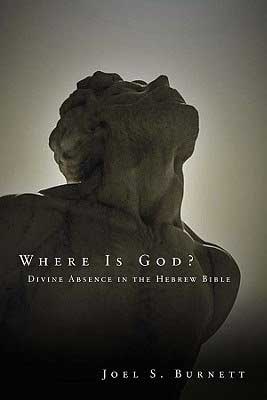
Quotations From The Book
“Divine Absence” Was Not Unique To Israel
In the pages of the Hebrew Bible. the notion of divine absence comes to expression in a variety of forms.… Samuel Terrien published a monograph three decades ago titled, The Elusive Presence.… Terrien argued that the absence or elusiveness of Israelʼs God was unique in the ancient world and that it set apart the Israelite understanding of the divine. Continuing study of texts from the ancient Near East has shown the prevalence of this divine elusiveness among the gods of ancient Israelʼs neighbors and predecessors.
The Hebrew Bible captures the theme of divine absence most poignantly in the question “Where is God?” Covering a range of circumstances, this expression appears both in the supplications of worshipers and in the taunts of enemies.… “Where is your God?” “Where is my God?” “Where is their God?” “Where is Yahweh?” Or, as Isa 63:11-12 asks,
Where is the one who brought them up out of the sea…
who divided the waters before them to make for himself an everlasting name, who led them through the depths?
One might think of divine absence as a problem of unfulfilled expectations of divine benevolence of faithfulness; in short, it expresses a crisis in the divine-human relationship.
Second, as noted, the problem of divine absence was not peculiar to ancient Israelites but also preoccupied their neighbors and forebears. This concern is registered in connection with the Hebrew Bibleʼs top villainess, the hated Jezebel, whose name in Phoenician means, “Where is the Prince?” which was also an epithet for the Canaanite storm god Baal-Haddu. Note this passage from the Ugaritic Baal Cycle, where the storm god is mourned with the exclamation:
Where is mighty Baal? Where is the Prince, the Lord of the Earth?
“Consolidation Of Divine Power In A Single Deity” Was Not Unique To Israel
In Canaanite Myth and Hebrew Epic, Cross understands the epithets Elyon and Shadday to relate to Elʼs role as divine warrior. As Mark Smith points out, the explicit West Semitic evidence is admittedly sparse for El as divine warrior and completely lacking for Baal as creator. For Smith, as the Ugaritic evidence suggests, in West Semitic tradition these were originally separate mythic roles belonging to different deities of the pantheon. Their combination in Israelite tradition results from the consolidation of divine power in a single deity, namely, Yahweh, and something similar happens in the case of the Babylonian state god Marduk as reflected in Enuma Elish. For further discussion of dynamics involved in consolidation of divine roles in state gods, see Smith, God in Translation, esp. 91-185. Though Smithʼs point about the scarcity of West Semitic evidence is well taken, the totality of all the evidence (including the significant evidence of Enuma Elish) favors an integral connection between these roles. [endnote 42, p. 202, Where is God? Divine Absence in the Hebrew Bible]
[NOTE, on the topic of shared depictions of deity in the ANE see THIS video, which is not to be confused with the scholarly work of Mark Smith, but it points out a few parallels between the deity of Israel and the deities of Ugarit.]
Did A Very Early Text In The Hebrew Bible Originally Speak About Yahwehʼs People And Land Being Parceled Out To Him By An Even Higher God, Elyon--“The Highest?” And Was It Only Later That Yahwehʼs Followers Began Claiming He Was God Of The Whole Earth?
Consider the following translation of Deut 32:8-9 which is not controversial except for the phrase, “Bull Elʼs children,” which differs from standard texts and translations that feature the phrase, “sons of Israel”:
When Elyon (“the Highest”) gave the nations an inheritance,
when he divided humankind, he set the bounds of the peoples
according to the number of Bull Elʼs children
and Yahwehʼs portion was his people, Jacob,
the measured portion of his inheritance.
A text of Deut 32:8-9 discovered at Qumran along with parallels in ancient Ugaritic literature led to questions among scholars concerning Deut 32:8-9 -- did the passage originally speak about “sons of Israel” or about “divine sons of El” each receiving their inheritance, including Yahweh (as a divine son of El) receiving his people and inheritance, Jacob? For information concerning such questions I suggest reading Thom Starkʼs book, The Human Faces of God. Also check out…
Deuteronomy 32:8 and the Sons of God by Michael S. Heiser
Elyon, Bull El, and Yahweh: Another Look at Deuteronomy 32:8-9
In the Hebrew Bible as in other ancient Near Eastern texts, the basic social institution of the patrimonial household can be projected onto the divine realm. Such is the case in Deut 32:8-9. It portrays the ordering of the divine family in relationship to ascending levels of social complexity among humankind. Here, the senior head over the next generation of gods is identified by the divine title Elyon (“the Highest”). Elyon divides the people of the earth and their territories “according to the number of divine beings” [Bull Elʼs children]. The deity thus assigned to Israel as its divine sovereign is Yahweh, and Israel is Yahwehʼs assigned patrimony, “the measured portion of his inheritance.” This mytheme thus describes a parceling of both people and land as a divine patrimonial estate and in so doing employs the terminology of sonship and property inheritance. [p. 44, Where is God? Divine Absence in the Hebrew Bible]


No comments:
Post a Comment